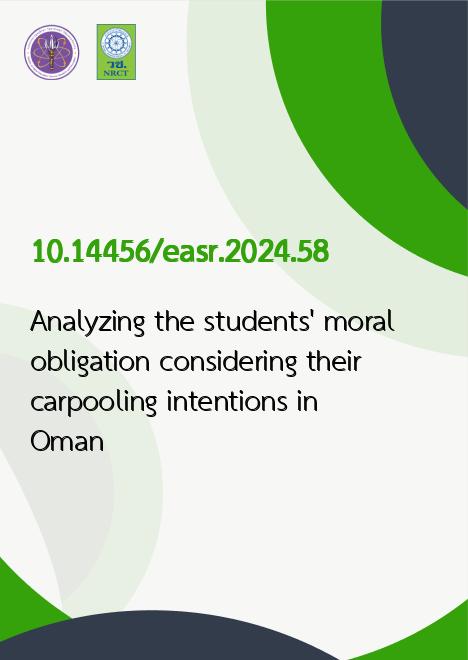
|
Analyzing the students' moral obligation considering their carpooling intentions in Oman |
|---|---|
| รหัสดีโอไอ | |
| Creator | 1. Muhammad Ashraf Javid 2. Moamin Aymen Al-Khayyat |
| Title | Analyzing the students' moral obligation considering their carpooling intentions in Oman |
| Publisher | Faculty of Engineering, Khon Kaen University |
| Publication Year | 2567 |
| Journal Title | Engineering and Applied Science Research |
| Journal Vol. | 51 |
| Journal No. | 5 |
| Page no. | 618-625 |
| Keyword | Traffic congestion, Carpooling, Questionnaire survey, Regression analysis, Oman |
| URL Website | https://ph01.tci-thaijo.org/index.php/easr/index |
| Website title | Engineering and Applied Science Research |
| ISSN | 2539-6161 |
| Abstract | The rise in private vehicle use causes traffic congestion on the road network and increases the social costs of the trips. Travel demand management (TDM) strategies are deployed to mitigate traffic congestion sustainably as these strategies spread travel needs in space and time by influencing individual travel behavior. Carpooling is a TDM measure used to decrease the use of single occupancy vehicles and promote shared mobility among travelers sharing the same origin-destination and following the same route. This study attempts to identify the correlations between the socioeconomic demographics of travelers and their carpooling potential considering the moral obligations. A questionnaire survey was conducted with the students of the University of Nizwa, Oman, and a total of 156 samples were collected. The results revealed a high interest of respondents in carpooling as a passenger as well as a driver. The respondent's moral obligations are high to carpool for the reduction in traffic congestion, air pollution, and energy consumption. The category analysis showed some differences in interests among different groups. The ordered regression analysis revealed that variables of gender, present travel mode, trip distance, car driving, and carpooling as passengers are significant in determining the moral obligations of the travelers. These results implicate that specific carpooling programs based on specific market segments have the potential for consideration and implementation. |